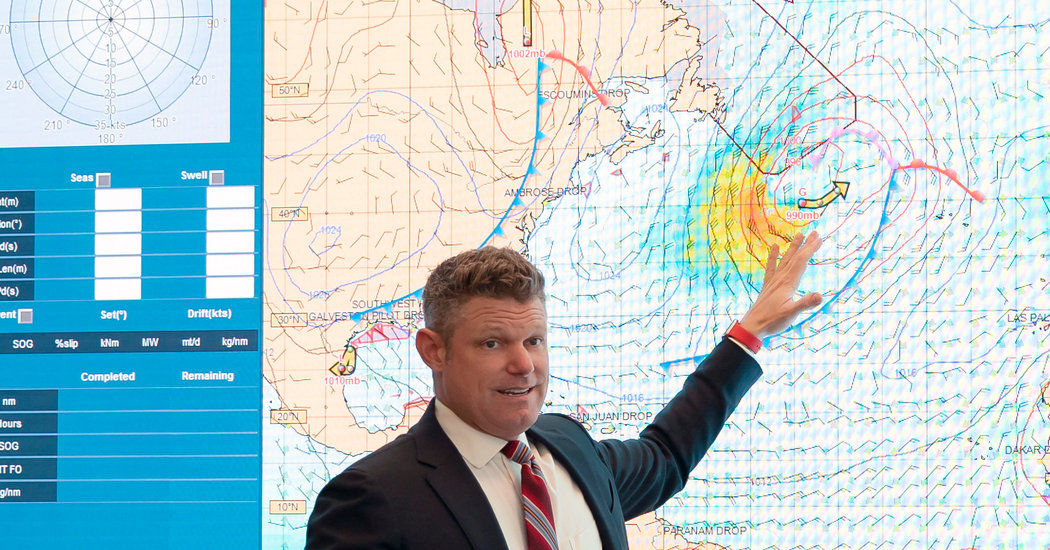
Most cruise lines have a large staff that includes a deck crew, housekeeping, entertainers and more. But only one has a chief meteorologist whose sole job is to track the daily weather for multiple ships and about 150,000 passengers.
James Van Fleet joined Royal Caribbean International two years ago, after more than two decades as a meteorologist on television and radio. As the first full-time, on-staff chief meteorologist for both the company and the cruise industry, a position he calls a “dream job,” he travels around the world and works with cruise staff to keep travelers safe.
He has helped dozens of captains navigate through storms and heavy rain, fog and other inclement weather. His job also involves forecasting the weather weeks ahead, to help the company’s shoreside and shipboard teams decide if they should cancel, reroute or reschedule cruises.
Mr. Van Fleet spoke with The Times about growing up around tornadoes, his odd work hours and how the weather in the Bahamas could affect the 135-foot waterslide at Royal Caribbean’s newly reopened private island, Perfect Day at CocoCay.
How did you become interested in meteorology?
I grew up in Tulsa, Okla., where the weather can literally kill you. When we have tornado days, the state shuts down. Everyone pays attention. It’s in my DNA. I started in some radio stations, then I worked behind the scenes in television. I did some storm chasing and got on television, working for Fox, ABC and CBS affiliates. A recruiter reached out about this job.
Could you walk me through your typical day?
I’m up in the middle of the night tracking Australia and Asia. In the early morning, I’m tracking Europe, and during normal workday hours I’m looking at the Caribbean. It never stops. It’s the complete opposite of a nine-to-five job. I get to work with people on the other side of the globe.
How does data inform your work? Is this kind of forecasting different from television forecasting?
You have to have current weather data to make a forecast. You got to know what’s happening right now. For example, what’s happening in Europe now and what will be happening in Europe later?
This is the most challenging forecasting I’ve ever done. It’s trickier than just ‘is it going to be windy or is it going to rain?’ The stakes are quite high, so I never step away from the data for too long. I need to know what’s been going on in different places at different times. Several times a day at hours that make no sense to anybody, I’m looking at data. I’m always asking myself: What did the weather data say a day or two days ago?
Are there any unique weather considerations on the new island, CocoCay?
There’s a big waterslide and because of its height, we have to be careful about tracking lightning. There’s also a big balloon ride that takes people up to 450 feet and we have to really think about the wind there.
How many ships are you usually keeping track of at a time?
I’ve been on 24 of the 26 Royal Caribbean International ships. It takes every bit of the time to get to every one and build relationships. I keep an eye on the ships of our sister lines, but I’m more involved with these 26.
I work with two dozen meteorologists who have gone to the academy and gotten basic meteorology skills. They are great. Part of my job is to help educate them on things they didn’t learn in the academy.
It’s not typical for a cruise company to have a full-time meteorologist on staff. Was your position created in response to the weather-related accidents Royal Caribbean had in 2016?
This company walked the walk when it realized things were going in a direction that put guests in trouble. It made the changes to address that. The accidents are not something we’re proud of, and changes have been made to help us keep that from happening again.
Less than a year after those accidents, I was hired. And obviously this is a dream job for me, but it also speaks to the company prioritizing safety. A cruise ship is a city at sea. There’s going to be a fender bender, a stubbed toe. But the sooner you can catch issues, the sooner you can make adjustments. My job is to help catch things early.
Are hurricanes your biggest concerns?
You’d think so, but no. The smaller stuff like fog can be harder to deal with, harder to forecast than hurricanes, typhoons and tropical storms.
This interview was edited and condensed for clarity.
52 PLACES AND MUCH, MUCH MORE Follow our 52 Places traveler, Sebastian Modak, on Instagram as he travels the world, and discover more Travel coverage by following us on Twitter and Facebook. And sign up for our Travel Dispatch newsletter: Each week you’ll receive tips on traveling smarter, stories on hot destinations and access to photos from all over the world.






